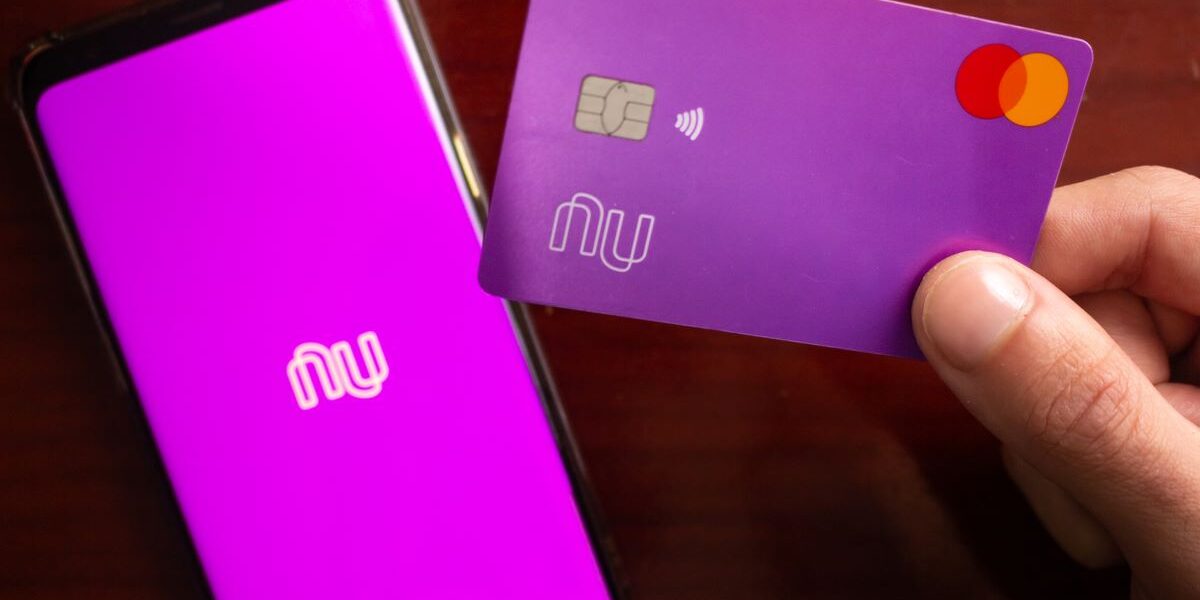Nu Pagamentos is heading for IPO this week. The bank has had a meteoric rise in the Brazilian banking firmament which has little precedents. Nubank, as the digital bank founded in 2013 is known has no physical branches. Its staff is about 5% of its competitors’ workforces and its assets are a minuscule fraction of those held by peers.
Yet in just eight years, it has claimed a spot as one of Latin America’s biggest banks by market value.
On Dec. 9, the digital bank that rose to fame with its purple zero-fee cards will launch an IPO on the U.S. NYSE. The company is targeting a $40 billion market capitalization value. It is a threshold that could potentially relegate Itaú Unibanco Holding SA to second place among the region’s largest financial institutions.
A successful float would represent another milestone for Latin America’s booming startup sector. Through its U.S. IPO, Nubank is set to join a select group of Brazilian fintechs. It will do so along with acquirer StoneCo and investment brokerage firm XP, which have both reached multibillion-dollar valuations.
A value test for fintechs
But for many, the outcome of this particular IPO this week will reflect more than just the value of the company. It will also be a measure of a burgeoning fintech industry that has attracted increasingly higher levels of investment capital over the past few years.
“Nubank’s IPO symbolizes a value test for the entire digital economy,” Joelson Sampaio, a finance professor and economist at Brazil’s Getulio Vargas Foundation, said in an interview. “The digital market is quickly consolidating and the IPO will show how much of that growth is here to stay.”

The stringent lockdowns enforced during the COVID-19 pandemic were an extraordinary driver for digital adoption. Millions of Latin Americans turned to smartphones to conduct payments, take out loans or invest their savings.
Companies that offered digital finance services expanded rapidly, incorporating clients at unprecedented rates. According to Banco Central do Brasil, some 16 million people entered the financial system between March 2020 and November 2021.
“It was a massive opportunity for whoever had a solid operation prior to COVID,” João Bragança, a principal with Roland Berger consultancy firm, said. “The pandemic didn’t really change the direction, but it was a very strong accelerator of underlying transformations.”
“Banks are not really sexy brands anymore”
Nubank was in pole position to benefit from this unexpected acceleration in online finances. It reported it had reached 40 million users in the first half of 2021. Its client base is quickly closing in on those of the biggest players in the industry.
Its early-stage success and rapid growth caught the attention of world-leading investment firms. Among those is Warren Buffett’s Berkshire Hathaway Inc., which made a $500 million investment in 2021.
Nubank’s unconventional decisions — such as appointing 28-year-old music superstar Anitta as a board member — and its flamboyant style managed to grow its client base and establish itself as a reputable brand among millennials.
“Banks are not really sexy brands anymore,” Bragança said. “Nubank has a good image in the market, probably more friendly and modern than the one big banks have.”

Nubank vs. traditional banks
With an earlier $30 billion valuation, Nubank already surpassed the market value of traditional behemoths such as Banco Bradesco SA, Banco Santander (Brasil) SA and Banco do Brasil SA.
The upcoming IPO this week should position it as a real competitor for big banks. “From a valuation point of view, they will now be peers,” Bragança said.
But marked differences remain between Nubank’s business model and those of traditional banks.
While Nubank has no physical branches, Banco do Brasil owns a massive network of 4,906 offices. It is a phenomenal physical infrastructure that spreads across thousands of municipalities. The state-controlled bank holds some 1.7 trillion Brazilian reais in assets, roughly 33 times the 50 billion reais reported by Nubank.
And yet, at least in the eyes of investors, the digital bank is already worth twice as much.

Despite such significant gaps in their valuations, it is clear that big banks in Brazil continue to deliver sustainable gains for their shareholders.
The four largest banks in Brazil each reported a net income of between 13 billion and 16 billion Brazilian reais in the first half of 2021. A solid business model has allowed lenders to continue to drive profits despite the pandemic.
In contrast, the digital bank reported a 230 million reais loss in the same period. Going forward, monetizing its massive client base will be key. It is likely that Nubank will face growing pressure to do so sooner rather than later.
For Luis Santa Creu, a longtime bank analyst in São Paulo, Nubank’s impressive customer growth is yet to be reflected in its profits. “The biggest challenge for Nubank will be to find a way to produce profits,” he said in an interview.
“Market cap and impact on the sector are two different things,” he added.
A fintech leader emerges
Client growth and its relatively light cost structure have been the bank’s most attractive features for investors. With 5,400 employees, it can compete with larger banks while maintaining a much lower level of fixed costs. Large banks such as Itaú and Banco do Brasil employ over 90,000 people.
For Getulio Vargas’ Sampaio, Nubank’s lean structure bodes well for regionalization. Valuations are being driven by Nubank’s potential to become a leading regional bank and not just country-based, he argued.
“The Latin American fintech industry will have its front-runners in the future and Nubank is clearly looking to seize that leadership,” Sampaio said.
But there is still a long road ahead for Nubank to fully realize its potential. Its IPO this week is just one step in that direction.
“There is much more uncertainty about the digital economy than there is about traditional banking in Brazil,” Sampaio said. “Banks are already consolidated and have had their expansion. There is not really much room for additional growth for them.”

The upcoming IPO this week
On Nov. 30, the company announced that it had reduced its initial target price by about 18% based on an adverse sentiment in global stock markets. As a result, the company is now looking to tap some 40 billion reais in its ipo this week, down from the 50 billion reais it had originally projected.
The digital lender had initially planned to tap some $3 billion on its IPO. Experts believe that funding resulting from the IPO will be applied to fund Nubank’s geographical expansion and its product diversification in Brazil.
Since its original card products, the company has moved into other products. These include savings accounts, loans and insurance. It has also expanded to other markets in Latin America such as Colombia and Mexico.
Nubank has also bought its way into investing through the acquisition of digital investment broker Easynvest. According to S&P Global Financial Director Guilherme Machado, incorporating investment into its financial ecosystem should contribute positively to its profitability pursuit.
To that end, other major investments in the past year and a half include Amica Financial Technologies Private Ltd. and Spin Pay payment service provider, Market Intelligence records show.
Nubank declined Market Intelligence’s request for comment.
A path to profitability
Although some experts argue that Nubank’s threat to other banks’ profitability is not immediate, that risk could increase over the medium term for large lenders. “With big banks in Brazil, it is going to be a long-term competition,” analyst Santa Creu said.
For some, however, the turning point might be closer than expected. Nubank has yet to report third- and fourth-quarter results, and some believe it could be increasingly close to reaching the break-even point.
Although traditional banks in Brazil acknowledge competition, they have frequently played down the risk. Online bank´s share of credit is still very small in Brazil’s vast credit market.
But that picture could gradually change. For Bragança, if Nubank were to turn profitable sooner rather than later, it could mark a turning point for the industry.
“If they [manage to show profits in 2021], then this is going to be a really major concern for Brazilian banks,” he said. “Once you have a digital bank operating a profitable business, it means that they are doing the right things.”
“It means that they found a way to profitability,” he said.
Full story at Market Intelligence.







